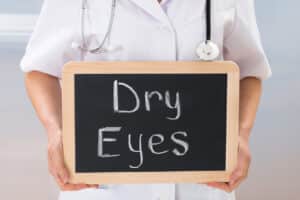
Dry eye is a condition that occurs when a person’s eyes don’t produce enough tears or the tears they do produce aren’t of a good quality. The result is eyes that are red, sting, burn, or itch. They may even water a lot, which is the eye’s reaction to the irritation and inflammation that comes with dry eye. It’s a problem that can impact your aging relative’s quality of life. It can make it difficult to read, drive, or use a computer. Knowing how to cope with dry eye symptoms can make them more comfortable. Below are some tips for coping with dry eye.
Use Over-the-Counter Eye Drops
There are lots of non-prescription options for eye drops that can lubricate the eyes. Some people may only need to use them once a day, but others may have to use them several times per day. There are different kinds of eye drops available. The Mayo Clinic recommends considering the following when choosing a product:
- Preservative vs. Non-Preservative: Eye drops with preservatives have a longer shelf life. They are a good option for people who don’t have to use drops often. Using them several times per day can irritate the eyes. Non-preservative drops come in small single-use vials. They are a better option for people who use drops four or more times per day.
- Drops vs. Ointments: Ointments work for longer than drops because they are thicker and coat the eye. However, they can cloud vision, so they should be used only at bedtime.
- Drops for Redness: Eye drops that reduce redness can cause irritation, so they should not be used to treat dry eye.
Senior care can remind older adults to use eye drops, but make sure they don’t use them too often. They can also drive the senior to the pharmacy to purchase drops or ointments.
Warm Compresses
Dry eye can be caused by clogged oil glands. Wet a clean cloth with warm water and place it over the older adult’s eyes for a few minutes. Press gently at the corners to help unclog glands. A warm compress can also ease irritation and make the eyes feel better.
A senior care provider can prepare the warm cloth and wet it often to keep it warm.
Eat More Fish
Eating fatty fish that contain omega-3 fatty acids can help support the glands that produce the fatty oil found in tears. Fatty fish includes salmon, sardines, tuna, trout, and mackerel. Older adults can also get omega-3s from vegetable oil, walnuts, and flaxseed.
Senior care providers can help older adults to plan meals that include good sources of omega-3s. They can also take your loved one grocery shopping and prepare meals for them.
Sources
https://www.mayoclinic.org/diseases-conditions/dry-eyes/diagnosis-treatment/drc-20371869
https://www.allaboutvision.com/conditions/dryeye.htm
https://www.webmd.com/eye-health/dry-eyes-home-remedies#1
https://nei.nih.gov/health/dryeye/dryeye
If you or an aging loved one are considering senior care in Far West Houston, TX, please call the caring staff at At Your Side Home Care. We will answer all of your senior care questions. Call today: (832) 271-1600.
Our Certified Nurse Aides, 24-Hour Live-in Assistants and Home Health Aides are available 24 hours a day, 365 days a year. We also provide the security and confidence of 24-hour Telephone Assistance, so fast, reliable help is always available when it's needed. To learn more about our homecare services see our homecare services page.
Different people need different levels of homecare. To meet the requirements of our clients, At Your Side Homecare maintains consistent staffing levels of caring professionals. Homecare service is available for as little as a few hours a week, or as many as 24 hours a day, seven days a week
- 5 Signs a Senior Might Be in the Beginning Stages of Dementia - April 25, 2025
- What Solutions Can Help Seniors with Mental Health Challenges? - April 18, 2025
- How Does Senior Home Care Help Make Aging in Place Possible? - April 11, 2025



